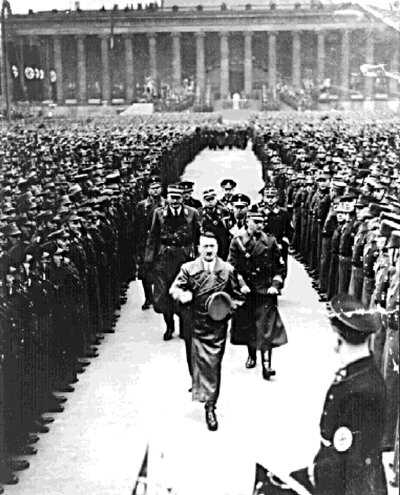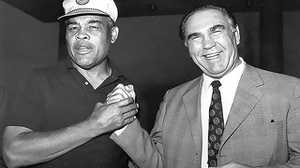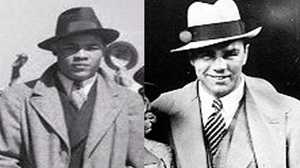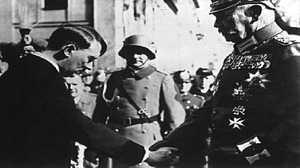Nazis in the News: 1936

The French-German border, 1936: The Rhineland Crisis
In 1936, Americans looked on as Adolf Hitler remilitarized western German lands near the Rhine River and the eastern border of France. Hitler's action was designed to create a diplomatic crisis by rejecting the terms of the Versailles Treaty, which had prohibited Germany from keeping troops in that territory. While the citizens of Cologne cheered at the Nazis' show of force, the world worried about whether Europe was headed once again toward war.
Soon after the crisis, German boxer Max Schmeling met Joe Louis for the first time in the ring, and crushed the seemingly unstoppable Brown Bomber. German sportswriter Volker Kluge describes Schmeling's role as a Third Reich mouthpiece in the U.S.: "His assignment was to calm down the American people."
In the U.S., Hitler's rise was front-page news and, for some, cause for worry.
The Cleveland Press, March 7, 1936
Hitler Troops Occupy Rhine Area, Scrap Locarno Pact
Adolf Hitler sent troops into the demilitarized Rhineland zone today and thereby tore to shreds the last repressive clauses of the Versailles Treaty.
Coincidentally he announced that the Locarno Treaty which guarantees the frontiers of Germany, France, and Belgium -- and the Rhineland zone -- had ceased to exist because of France's new military alliance with Russia.
But in this final defiance of the World War allies, Hitler offered all Germany's neighbors a program he said would bring a real lasting peace and friendship to nations...
All over Europe statesmen met to talk over the situation. Telephone and telegraph wires and cables flashed diplomatic dispatches. Diplomatic couriers were started on a race through Europe by train, motor car and airplane.
The diplomats had before them the material for a war or for peace, for a new effort to end the jealousies, fears and hates that have endured for more than 17 years since the World War ended -- or for months or years more of bickering...
The [Philadelphia] Evening Bulletin, March 7, 1936
Washington Sees France Defied
Hitler's Action a Direct Challenge to Paris
Will guns boom again on the Western Front?
This question absorbed the Capital today, as officials tensely watched Adolf Hitler's re-militarization of the German Rhineland...
A fundamental principle of foreign policy of every French Government since the Allied victory over Germany in 1918 has been to keep the German western frontier, marked by the Rhine, demilitarized to remove what the French regarded as an ever present menace to the security of France and Belgium.
The Cleveland Press, March 7, 1936
Cheers Greet Reich Troops
Swastika Flags Hung Out as Soldiers March Into Towns, Villages
German troops crossed the River Rhine today for the first time in nearly 17 years to occupy key cities as symbols of Germany's complete emancipation from the military clauses of the Versailles Treaty.
They appeared, battalion after battalion, in cities where no German soldier under arms had been permitted...
Along country roads, on railways, they approached the 30-mile forbidden strip on the German side of the Rhine...
It was a complete surprise to the public... As they approached the forbidden zone, word went ahead that they were coming and the thud of their field boots was lost in a burst of cheers... People massed in the streets to celebrate their freedom...
It was not long before the Nazi Swastika was whipping in the air in every town and hamlet of the Rhineland.
The [Philadelphia] Evening Bulletin, March 10, 1936
Cloudy But Not Stormy
...What Great Britain is prepared to do has been the all-important matter to France. The promises of Russia, Poland, and lesser Powers to stand by it in demanding some positive action mean little to it if England, while condemning German breach of international law, is ready to discuss terms with the aggressor. Already many in French Government circles have given up hope of agreement of the Powers on effective sanctions.
The United States is fortunately out of the controversy, and has to make no decisions. But American opinion will consider of value the opinion of so competent a man as Jacob Gould Schurman, a staunch supporter of the Allied cause during the war and Ambassador to Germany at the time the Locarno treaty was signed. He urges France, as well as England, to take up Hitler's new plan at face value and see what can be made of it as a guarantee of peace...
Skies in Europe are still clouded. But responsible statesmen stand against rash action that might lead to war.
The Cleveland Press, March 10, 1936
The World Scene
by F. H. Sterbenz
Germany's troops are back in the Rhineland, and I think they will stay...
Most statesmen, I think, will recognize that there is much to be said for Germany's re-occupation of its own territory. They will recognize that Germany is right in wishing to secure itself against external aggression. They will, of course, regret that Germany has taken the step without consulting the powers signatory to the Locarno agreement, who should have been consulted.
But even this bit of arrogance can be forgiven as a bit of Hitler drama to impress the Germany populace, who have been dissatisfied because of the food shortage and the increase in unemployment and the reduction in income...
I don't blame the French people for feeling a bit hysterical as the Germans wipe out the demilitarized zone and move up to the French frontier. But I hope that there will be calm men in all countries who will be able to sit down at Geneva in an effort to find a way to live in peace with the new Germany.







